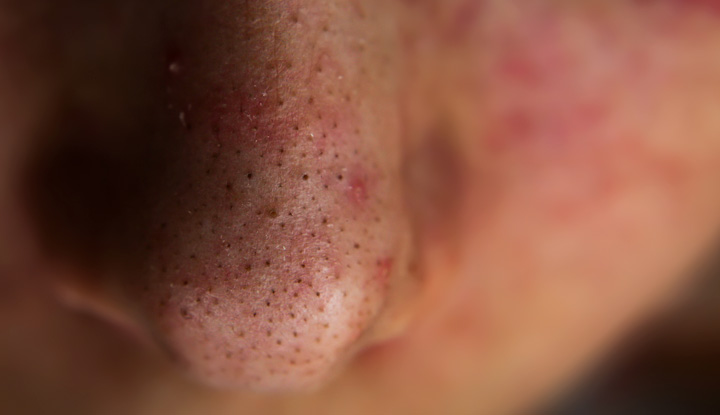Blackheads are a very common skin condition that mostly affects your face, neck, back and chest. There are a variety of causes, including too much oil on your skin and hair follicle irritation. Blackheads commonly affect adolescents, but they can occur at any age.
Advertisement
Cleveland Clinic is a non-profit academic medical center. Advertising on our site helps support our mission. We do not endorse non-Cleveland Clinic products or services. Policy

Image content: This image is available to view online.
View image online (https://my.clevelandclinic.org/-/scassets/images/org/health/articles/22038-blackheads)
Blackheads are a type of acne (acne vulgaris). They’re open bumps on the skin that fill with excess oil and dead skin. They look as if dirt is in the bump, but an irregular light reflection off the clogged follicle actually causes the dark spots.
Advertisement
Cleveland Clinic is a non-profit academic medical center. Advertising on our site helps support our mission. We do not endorse non-Cleveland Clinic products or services. Policy
Blackheads aren’t pimples. Pimples are small, painful, discolored bumps with a thick, white-yellow fluid (pus) at the tip.
Blackheads typically affect teenagers and young adults undergoing hormonal changes. However, many adults continue to have acne into their 20s, 30s and beyond. Some even develop blackheads for the first time as adults.
Blackheads are very common. Some researchers suggest that blackheads affect nearly everyone during their lives. They’re most common among adolescents, but up to 10% to 20% of adults have blackheads too.
Your face (especially your nose and chin, sometimes your cheeks), neck, back and chest are most likely to develop blackheads. However, oil (sebaceous) glands are all over your body. They release an oily lubricant called sebum that helps keep your skin and hair hydrated and shiny. As a result, though it isn’t common, blackheads sometimes appear on your butt, thighs, ears and armpits.
Blackheads don’t seriously affect your physical health, but they can affect you psychosocially (how society and social groups affect your mind) and psychologically (your self-perception and behavior). Blackheads can cause anxiety, depression, mood disorders and suicidal thoughts.
Advertisement
Blackheads are a milder form of acne. Dark, open bumps in your skin are the main characteristic of blackheads. They don’t hurt or feel uncomfortable like whiteheads.
Sebaceous glands are located all over your body, and most of them connect to hair follicles. Blackheads and whiteheads are comedones (singular comedo). Blackheads are open comedones, and whiteheads are closed comedones. Comedones occur when a hair follicle/sebaceous gland becomes inflamed. Inflammation can occur as a result of:
Blackheads aren’t contagious. You can’t spread blackheads to another person through skin-to-skin contact.
Blackheads are easy to recognize, so you don’t necessarily need a healthcare professional to diagnose them. If you have blackheads along with other severe forms of acne, see a dermatologist for treatment. Dermatologists are doctors who specialize in conditions that affect your skin, hair and nails.
Video content: This video is available to watch online.
View video online (https://cdnapisec.kaltura.com/p/2207941/sp/220794100/playManifest/entryId/1_0icqwd3e/flavorId/1_5f3sgelj/format/url/protocol/https/a.mp4)
Learn tips to remove blackheads.
Nonprescription medications can treat blackheads. These may include:
If your blackheads don’t go away with nonprescription medications, your healthcare provider may recommend:
Advertisement
There are a few home remedies that may help treat blackheads:
Blackheads can sometimes go away on their own — it depends on how deep blackheads are in your skin. If a blackhead is close to the surface of your skin, it’s more likely to go away on its own. However, some blackheads can be deeply embedded in your skin. Deep, embedded blackheads are less likely to go away on their own. If you have embedded blackheads, a dermatologist or medical aesthetician can remove them.
Advertisement
It can be very tempting — and satisfying — to squeeze out or pop blackheads. However, squeezing out blackheads can create several problems:
Deep blackheads should be removed by a medical professional — usually a dermatologist or medical aesthetician. They use a small tool with rigid metal loops on the ends (blackhead or comedo extractor) to apply even pressure to your blackheads. They can safely remove the entire blackhead and reduce the risk of it returning.
Blackheads often go away in early adulthood, though some people will continue to experience them throughout their lives. Your healthcare provider, medical aesthetician or dermatologist can help you manage your blackheads.
Preventing blackheads is difficult, if not impossible, during normal hormonal changes. But some things can help:
Advertisement
See your healthcare provider as soon as you notice blackheads to start treatment immediately.
Blackheads are a common skin condition that affects the majority of people, especially adolescents. Because it mainly affects adolescents, many people attribute blackheads as part of the transition from childhood to adulthood and don’t see a healthcare provider about them. However, despite how common they are, they can have a severe effect on your mental health. If you notice symptoms of anxiety or depression due to the presence of blackheads, talk to your healthcare provider.

Sign up for our Health Essentials emails for expert guidance on nutrition, fitness, sleep, skin care and more.
Learn more about the Health Library and our editorial process.
Cleveland Clinic’s health articles are based on evidence-backed information and review by medical professionals to ensure accuracy, reliability and up-to-date clinical standards.
Cleveland Clinic’s health articles are based on evidence-backed information and review by medical professionals to ensure accuracy, reliability and up-to-date clinical standards.
Cleveland Clinic’s primary care providers offer lifelong medical care. From sinus infections and high blood pressure to preventive screening, we’re here for you.
